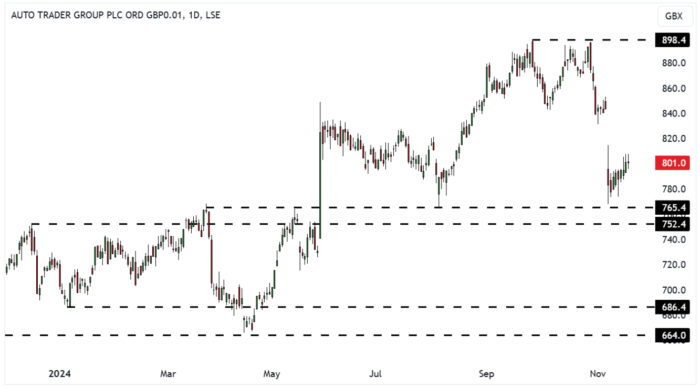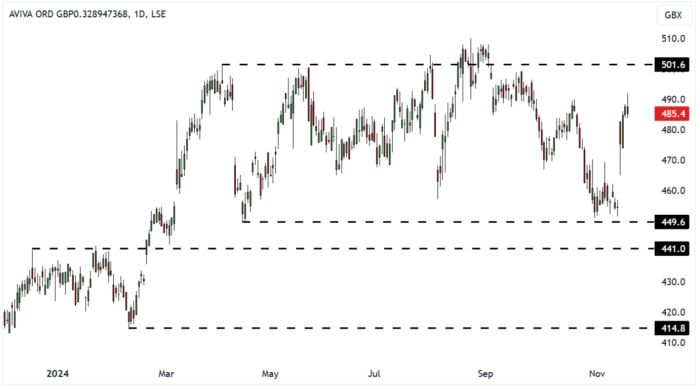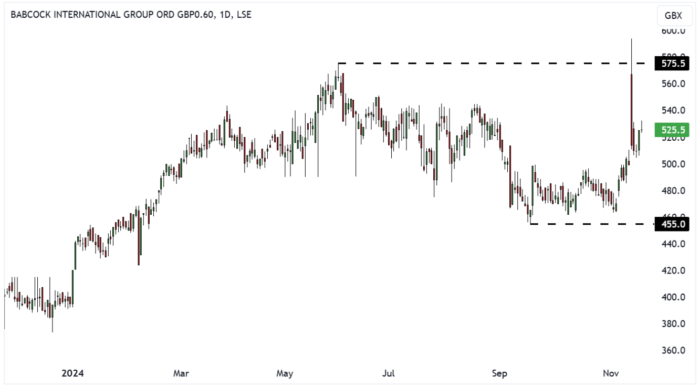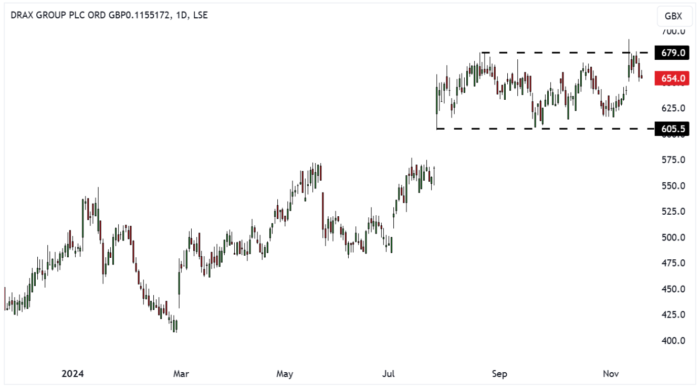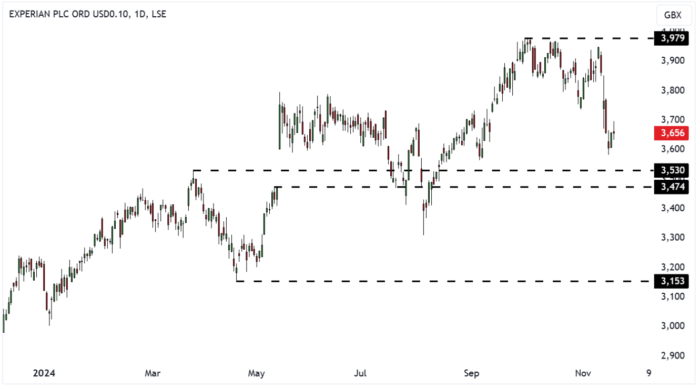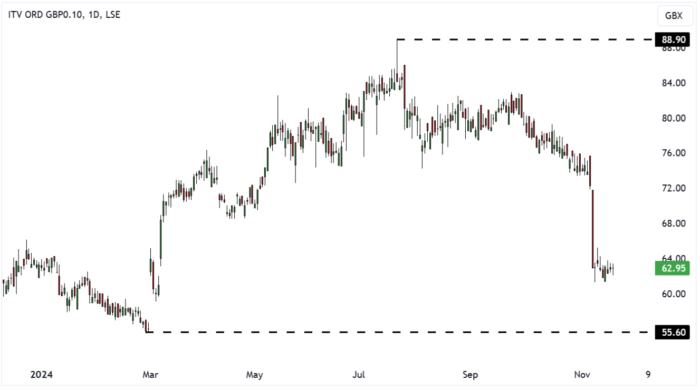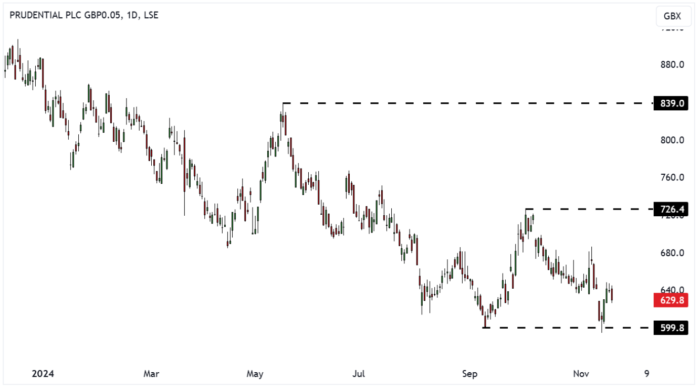20th Nov 2024. 9.02am

Regency View:
Update

Regency View:
Update
Auto Trader lose traction amid weaker market trends
Auto Trader’s (AUTO) share price weakened this month following a confluence of market and operational factors…
The company’s latest half-year results highlighted solid revenue growth and profitability, yet certain headwinds appear to have unsettled investors. Notably, the introduction of the UK’s Digital Services Tax led to a £5.1 million charge, which, while anticipated, added to concerns over rising costs.

Additionally, while retailer forecourt numbers grew, this expansion was largely driven by smaller, lower-yielding retailers, diluting the Average Revenue Per Retailer (ARPR) growth to 6.3%. The acceleration in used car sales, combined with restricted vehicle supply, also meant that Auto Trader’s stock lever failed to show meaningful growth, despite high consumer demand and record platform visits.
Broader concerns in the automotive market, including a 10% decline in new car retail volumes and the ongoing challenges of transitioning to battery electric vehicles, have likely added to investor caution.
Despite these pressures, Auto Trader remains confident in its long-term outlook, driven by its leadership position and continued investment in digital innovations like Deal Builder and Co-Driver. However, in the near term, the market’s reaction underscores sensitivity to operational dynamics and broader automotive trends.
Aviva jump on strong Q3 results and optimistic outlook
Aviva’s (AV.) shares surged following the release of its Q3 2024 trading update, which highlighted robust growth and profitability across all divisions.
General insurance premiums grew 15% year-on-year to £9.1 billion, driven by double-digit expansion in both UK and Canadian markets. Wealth net flows increased by 21%, reflecting strong workplace pension demand and a stellar performance from the Adviser Platform. Retirement sales soared 67%, boosted by bulk purchase annuity volumes and disciplined margin expansion.

The market responded positively to Aviva’s resilient solvency position which stands at a cover ratio of 195% despite elevated natural catastrophe costs in Canada and economic headwinds. CEO Amanda Blanc reaffirmed confidence in achieving Aviva’s 2026 targets, including £2 billion in operating profit and cumulative cash remittances exceeding £5.8 billion.
Investors were particularly encouraged by the company’s emphasis on its scalable customer base, which now exceeds 19.6 million, and its capital-light business focus. Aviva’s commitment to dividend growth and sustainable capital returns further solidified market confidence, propelling the shares higher as optimism for the insurer’s growth trajectory continues to build.
Babcock’s strong results set sail for growth
Babcock International (BAB) delivered a strong performance for the first half of its fiscal year, supported by robust growth in its Nuclear and Land divisions and solid operational execution across the board.
Revenue rose 11% organically to £2.41 billion, while underlying operating profit climbed 10% to £168.8 million. The company maintained an operating margin of 7.0%, demonstrating consistent efficiency despite the prior year’s high-margin contributions from one-off license sales.
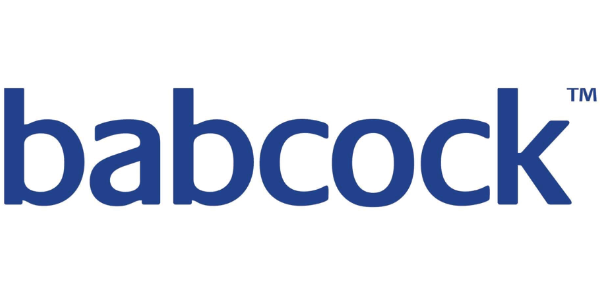
Cash flow and debt metrics also highlighted a period of financial strengthening. Underlying free cash flow jumped 41% to £94.7 million, driven by a combination of higher profitability and improved working capital timing. Net debt excluding leases reduced significantly to £145.8 million, translating to a conservative net debt/EBITDA ratio of 0.6x.
Babcock’s robust contract backlog of £9.5 billion, while slightly lower due to execution on long-term agreements, underpins confidence in meeting full-year guidance. The interim dividend was increased to 2.0p per share, reflecting management’s confidence in the company’s ongoing momentum and commitment to delivering shareholder returns.
CEO David Lockwood emphasised the supportive market dynamics driven by geopolitical instability, which continues to bolster demand for Babcock’s capabilities. The company is positioning itself to capitalise on increased defence budgets and the need for rapid availability of existing assets, aligning its strategy to deliver sustainable, profitable growth.
Drax delivers impressive numbers and expands clean energy horizons
Drax (DRX) has delivered a strong trading performance, with notable progress across its Flexible Generation, Pellet Production, and Biomass Generation segments.
The company is on track to meet its post-2027 target of generating over £500 million in earnings (EBITDA) from these key areas, supported by its role in the UK’s transition to a cleaner energy system. The National Energy System Operator’s recent report highlights the growing need for large-scale biomass to meet the country’s 2030 clean power goals, and Drax’s assets are positioned to play a pivotal role in this shift.
The company continues to focus on strategic growth, including the launch of Elimini, its US-based carbon removals business, and a robust share buyback programme of up to £300 million. Drax said its investments in energy solutions, including pumped storage at Cruachan and the development of its biomass supply chain, reflect its commitment to long-term sustainability and carbon reduction. With significant contracted power sales in place, Drax is well-positioned to capitalise on the increasing demand for dispatchable, renewable power.

Looking ahead, Drax said it remains focused on disciplined capital allocation while exploring new opportunities in carbon capture and storage (BECCS) and energy supply to growing sectors like data centers. With a strong financial outlook and a pipeline of exciting projects, including the potential expansion of Cruachan Power Station, Drax is making strategic moves to ensure its leadership in the clean energy transition, securing long-term growth and value for stakeholders.
Experian reports solid H1 growth, but falls short of expectations
Experian’s (EXPN) results for the six months ended 30 September 2024 fell short of market expectations, despite delivering positive revenue and EBIT growth.
The company posted a 7% increase in organic revenue, driven by strong performance in North America, Latin America, and EMEA & Asia Pacific. However, organic growth in the UK & Ireland remained modest at 2%. The Consumer Services division saw robust growth, with a 9% increase in revenue, benefiting from a rise in memberships and engagement. In contrast, B2B growth was somewhat subdued at 6%, with the credit environment in key markets like the U.S. and the UK showing signs of weakness.

Despite this, Experian continued to expand its EBIT margin by 60 basis points, achieving a 10% growth in EBIT at constant currency. Benchmark EPS grew by 9%, reflecting improved revenue and margin performance. Cash flow conversion remained strong at 71%, but there was a slight decline in statutory profit before tax, which dropped by 6%, primarily due to non-cash movements related to interest rate swaps. The company also continued its strategic investments, spending $818 million on acquisitions to support its growth initiatives, including purchases in fraud prevention, insurance, and credit bureau services.
Looking ahead, Experian maintained its FY25 outlook, expecting organic revenue growth of 6-8%, with a slight increase in margin accretion. However, despite these positive forward-looking projections, the company’s shares fell following the results announcement, reflecting investor concerns over the softer-than-expected performance in key markets.
ITV faces short-term challenges
ITV’s (ITV) Q3 results for the nine months to September 30, 2024, revealed a mixed performance, with shares falling due to ongoing challenges in ITV Studios and advertising revenue.
Total group revenue dropped 8% to £2.74 billion, driven by a 20% decline in ITV Studios revenue, primarily due to the US writers’ and actors’ strikes and the timing of production deliveries. However, ITV remains confident that the impact of these factors will be short-lived, with the company expecting record adjusted EBITA for ITV Studios by year-end, despite the lower-than-expected Q3 figures.

On the digital front, ITVX showed impressive growth, with streaming hours up 14% and digital advertising revenue up 15%. This continued momentum from ITVX is a bright spot for the broadcaster, and its digital strategy remains central to the long-term growth outlook.
Advertising revenue was flat in Q3, with a decline expected in Q4 due to tough comparatives from the Rugby World Cup and uncertainty surrounding the UK budget. Nevertheless, ITV is targeting a 2.5% increase in total advertising revenue for the full year. Additionally, the company announced £20 million in net cost savings, further improving operational efficiency.
Looking ahead, ITV’s studios are expected to recover strongly in Q4, with a strong production slate, including international hits for Amazon and Fox, as well as popular UK and international shows. ITV’s commitment to digital growth, alongside strategic cost reductions, positions the company for long-term success, with an average annual revenue growth forecast of 5% for ITV Studios through 2026. Despite short-term headwinds, we believe ITV’s ongoing transformation and robust digital platform provide reason for optimism in the longer term.
Prudential’s Q3 reflects solid growth, but shares dip on mixed outlook
Prudential’s (PRU) Q3 performance has shown strong results in several key areas, yet the market response was negative…
The group reported an 11% rise in new business profit for the year-to-date period ending September 30, 2024, with a more modest 9% increase when excluding economic impacts. APE (Annual Premium Equivalent) sales were up 7% for the first nine months, driven by solid performance across multiple regions, with a standout 10% increase in the third quarter alone.

Despite broad-based growth across regions, Prudential’s outlook remains cautious. CEO Anil Wadhwani highlighted a promising 9-13% new business profit growth trajectory for 2024, backed by strategic moves like full ownership of its Nigerian life operations and a new partnership with Bank Syariah Indonesia. However, the company faces challenges in certain markets, notably Malaysia and Indonesia, where APE sales were lower, and the shift to more traditional products in Indonesia has yet to fully materialize.
The shares responded negatively to the results, likely due to concerns over margin pressure in certain regions and slower-than-expected recovery in markets like Malaysia. Despite solid growth in Asia and other key markets, mixed results and a cautious outlook are dampening investor sentiment in the short term. However, Prudential remains confident that its transformation program will drive further growth in the long run.
Disclaimer:
All content is provided for general information only and should not be construed as any form of advice or personal recommendation. The provision of this content is not regulated by the Financial Conduct Authority.

